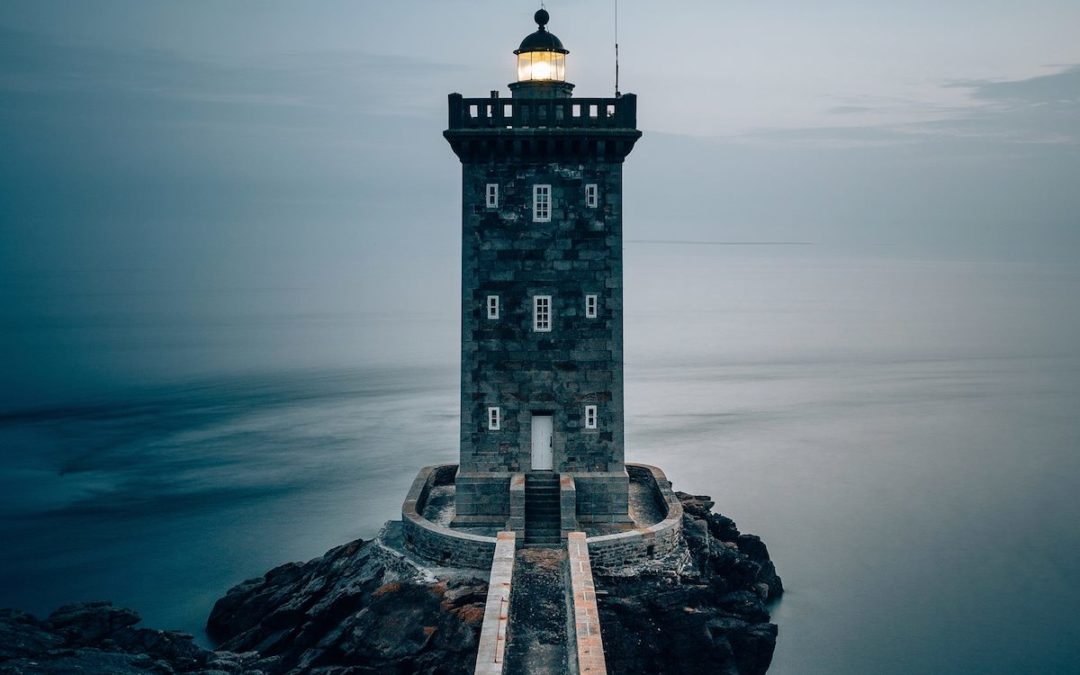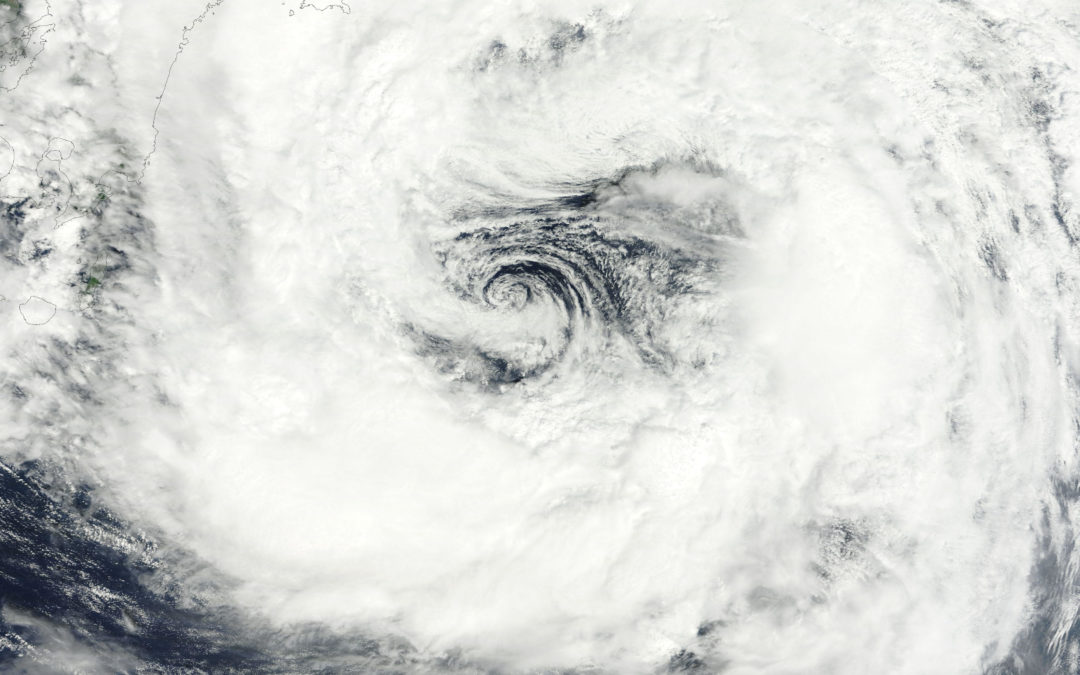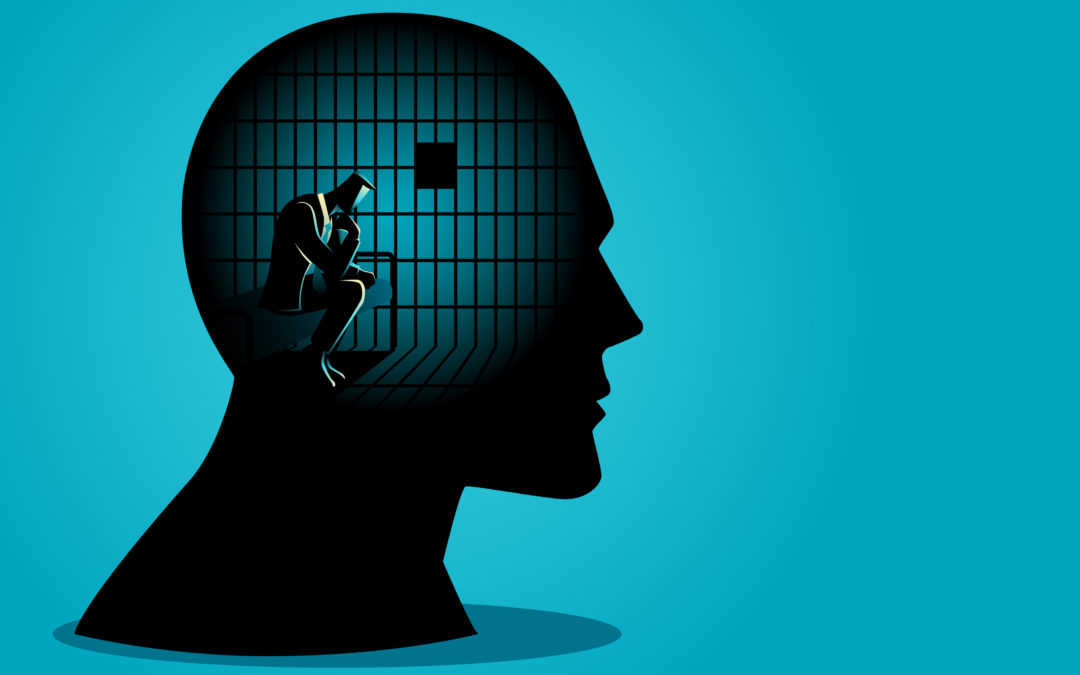
Finding Compassion through Boundaries
When it comes to recovery work, there is no more famous buzz word than “boundaries”. There have been thousands of books written about it. Coaches and therapists focus intently on teaching clients how to set boundaries. But the effort associated with boundaries is often too centered around behavior. Boundaries are taught as something we just need to practice. If we practice, we will get stronger at setting boundaries and we can have a better life. In some ways, that is true. Practicing behaviors can settle some of our fears over time. But setting boundaries is far more effective when we can understand what created the problem in the first place. And even more importantly, we need to understand what beliefs we carry that make setting boundaries so darn hard.
What created the problem in the first place? Why are boundaries so hard for survivors of childhood trauma? They taught us many reasons why boundaries were not acceptable. We might have been told we had no value as an individual person. We might have learned that our entire worth was defined by the impact we had on others. We might have understood that our emotions and thoughts were of no importance to anyone. So during the age where we were supposed to be developing a sense of self, we were erased instead. We learned there was no self. But why? Why did our abusers target us in this way? That’s simple. A person with strong boundaries is too confident to be abused. They won’t allow it. Or they will seek help from others. The erasure is critical to their goals.
How does this settle in our system? The impact is not small. It is like a nuclear bomb went off in our psyche. And as you already know, it takes time and patience to excavate all the traumatic wreckage from a childhood of abuse. And it is particularly difficult because we don’t know what we are looking for. So much of it lives in our unconscious. So I will lay out a few of the impacts we can bring awareness to. If we can see them, we can do something about them.
I don’t know who I am. I hear this statement from survivors all the time. And it makes sense. We underwent a sustained attack on our being for most of childhood. We heard from family members that our authenticity was unacceptable. We heard from society that we must develop a mask to gain approval from others. We learned from abusers that we only existed as a punching bag or a sexual target. And these messages were reiterated repeatedly as we explored any way to be ourselves until the futility was too strong to continue.
I must find people who reflect who I am. Since there appears to be no self left, survivors feel desperate about finding positive reflections in the external world. Life becomes years of seeking anyone or anything or any accomplishment that can make us feel good about ourselves. In this desperation, there is no consideration for boundaries because we have never been allowed. The only goal is to feel good even for a few moments here and there.
I must do what others want and need. Survivors are often lost when we consider the idea that we should be granted opinions or feelings. We learn to prioritize everyone and everything else. We have become accustomed to this way of living. We have even been rewarded with this way of living. So that is where we turn their focus. And after all those messages, it is incredibly difficult to shift.
After a childhood of this torture, why don’t we just let all this go? If you know me, you know this is a rhetorical question. We have internalized all of it. Our inner parts have taken on the beliefs that were passed to us from our abusive environment. So when we attempt to set a boundary, we are inundated with internal conversation about how selfish we are being, how much we need this person to like us, or how our reputation depends on our service to others. It is nonstop. If we are not in touch with our unconscious, it might manifest as anxiety when we try to set a boundary. It might show up as an inability to stick with a boundary we have already set. And if we are focusing on behavior only, we will likely fail.
This is why I will be devoting the month of October to Navigating Boundaries with Compassion. This compassion must be extended to ourselves first. Boundaries are always compassionate to self. But it is also extended to others by default. Why? When we set boundaries, we are communicating clearly with them instead of expecting them to read our minds. When we set boundaries, we avoid the anger and rage that builds under the surface and stops any real connection. When we set boundaries, we let people know who we are and where we stand, so they can choose to respect that or walk away. Either choice, we know where they stand. So join me this coming month on Survivor’s Guide for Life as we build our ability to set boundaries and find the freedom and compassion that comes with them.

Wake Up!
I don’t usually get alarmist in my blogs. But today I have an important message for anyone who will hear it. And it comes with emotion because sometimes it is just plain hard to live in this world. What’s my message? We can’t continue to live like this. It isn’t working. We are destroying our planet. We are destroying other people. We are destroying the next generation. The world is a reflection of our collective inner health. And I can tell you it is NOT good. And while there are plenty of “experts” out there who will tell you it is biological, chemical and out of our control, it isn’t. That is the convenient answer. That is the answer that takes the pressure off. But that answer is cursed with hopelessness. If there is nothing we can do to make life better, why bother with life at all? And let’s face it, those in power want us to feel like that. If we feel like that, we won’t change or question anything. Status quo favors those in charge. And that’s not us.
As I mentioned last week, the controller-enmeshed are running the planet. And the controller-enmeshed are asleep. They live their lives with no questions. They live their lives in fear. And they waste their time doing nothing that matters. But we don’t have to live that way. We have the option to wake up. We have the option to listen to what the anxiety and depression are trying to tell us. We can take the opportunity to explore why our lives are so chaotic and empty and unfulfilling. We can sit with our pain. We can sit with our truth. We can shine the light on what needs to be said. We can stop the denial. We can facilitate our own awakening. It is the only thing that will make a difference in this world. No matter how much we attempt to save this planet from the controllers of the world, we will only make lasting positive change by waking up. The more of us who wake up, the more positive change we will see.
The controller part of self represents the masculine. And I want to be clear, there is nothing wrong with having a strong masculine aspect of self. But there is a problem when it is completely unbalanced. We have lost the feminine completely. We have devalued it in self and in society. We have suppressed it within ourselves. We have suppressed it on this planet. And the unchecked masculine is a very dangerous thing. There must be balance and we don’t have it. I recently watched a video where a woman said, “Men would rather destroy the planet than let women run it.” And I immediately thought of the controller. The controller would rather destroy the body than share responsibility with a system of parts. It is a mirror. The health of the planet reflects the collective health of the people.
But why are we living this way? Fear. What does this fear look like?
We fear emotion. We are terrified of it. We actually believe it will kill us. If you don’t believe that, look deep inside yourself. Try to feel something … anything. What happens? Maybe your mind takes over and intellectualizes. Maybe you suddenly have to clean your kitchen floor. Maybe you close this blog and call it stupid. That’s the fear. The fear will take you far away from emotion in any way it can. And we are teaching our children the same. People in the “real” world are constantly telling my children not to feel. I know because my children tell me about it. My son was crying because he was in a school lock-down for a tornado warning. They had all the children facing a wall with their head in their hands. Why would an 11-year-old not cry? But of course, he was told not to cry. It wasn’t nasty. It doesn’t have to be. The message is the same. “Don’t feel.”
We fear the truth. We are living a lie. This entire planet is living a lie. Everything we do and think is a lie. What are these lies?
- Resources are scarce, so we can’t share. Lie!
- Nobody would do that to their own child. Lie!
- We must work, work, work and never take a break. Lie!
- We can’t take time for ourselves. Lie!
- It would be disrespectful and unloving to dredge up stories from the past. Lie!
- People are only telling those stories for attention, opportunism and revenge. Lie!
- Kids tell lies. Lie!
- People with mental illness are just lazy. Lie!
- People who are struggling in this world are less than others. Lie!
We fear what matters. We will do anything to avoid what matters. We will dive into electronics. We will gossip. We will redecorate the house. We will plan the next vacation. We will compare ourselves to others. We will dwell on the latest conversation with a relative or co-worker. We will rearrange the office again. But we will not look at what matters. We will live a life on the surface but avoid what is making the surface patterns happen. We won’t look for answers … at least not there. We will live a life of distraction and wonder why it feels wasted.
So wake up! The best thing you can do to save the world right now is to wake up. Your controller will try to stop you. They will inundate you with fear. But we owe it to the planet and the next generation to wake up. We must stop the destruction of the planet, our bodies, our mental health. It is time to feel, tell the truth and go deep. This is no longer a choice. It is time. It is now or never. Wake up!

Preparing for a Hurricane
There’s a hurricane heading for the East coast. If you live anywhere near me, you have been inundated with the news and warnings about it. That’s a good thing within reason. We all need to be prepared for things like this. We need to take precautions. Everyone’s survival skills kick in. The grocery stores are emptied. The gas stations are swamped. There is not a bottle of water to be found. Schools are preparing to close. People are getting sand bags ready. It is all people can talk about. And while I am certainly taking some precautions, I also find myself acting normally. Internally I feel no change at all.
Why? I am always preparing for a hurricane. Don’t get me wrong. I am not always watching the weather so closely. I am not always buying water or filling up the car with gas when it is only half empty. But I am always preparing. I am always planning. I am always watching. I am always looking for the next thing that will take me out. I live a hyper-vigilant life in a world that is unpredictable. And let’s face it. Hurricanes are not the worst thing that can happen. We know they’re coming for days. When I was a child, the storms in my house were must less predictable and they weren’t forecasted on the news. I had to be constantly watching.
My controller is the part who is so incredibly skilled at hyper-vigilance. They started learning these skills at a very young age. I have noticed the increased development of the controller in my young twins as they headed off to middle school the past two weeks. My kids were stressed heading into this new environment. But it appears that the first week of middle school is devoted to scaring the hell out of the children.
Don’t be late more than twice or we will call your mom. (I dare them.)
Don’t get a bad grade or it will affect your college choices. (They are in the 6th frickin grade.)
Don’t lose your gym clothes or your Chromebook or we will charge you lots of money. (It doesn’t work.)
Controllers eat this stuff up. They live for it. It is fuel for their fire. I have spent the past two weeks explaining to my children that the world will not end if they get a C or show up 1 minute late because their locker door got stuck. I can see their little controllers kicking into overdrive as they listen to this nonsense from the “real” world. I can see how they will spend the first ten years of their adult lives running like crazy to keep up with all the nonsensical rules from society. Then I can see how they will spend the next twenty years of their adult lives wondering why they are so tired and depressed. And then I can see how they will spend the rest of their adult lives trying to unlearn all the garbage thrown at them. Let’s face it. Preparing for a hurricane every day is exhausting. But that’s what they’re learning right now. I think we can all relate to this one statement from my 11-year-old son (going on 25).
“Mom, I am containing it. But inside I am freaking out!”
But what would happen if all of our controllers calmed down at one time? What would the world look like? I have some ideas.
We would all slow down. Now you are going to yell at me about what a rotten idea that would be because you are controller-enmeshed. But when people slow down, they can think about what really matters. They can connect in with themselves. They can look at what they really want and stop focusing on what everyone else wants.
We would stop following rules. I am not talking about important rules. I am not suggesting we should all become vigilantes or criminals. But we would question the rules that don’t make sense. We would ask if we are really doing things the best way. We would consider change for the better. We would question the way it has always been done.
We would stop caring about what other people think. When we slow down and question the rules, we wake up. And we start to realize that those who are rushing and never questioning anything are still living the Zombie Apocalypse. Yes, it’s real. We are living it. Once we realize others are asleep, their opinions matter much, MUCH less.
So let’s stop preparing for hurricanes (not literally). Let’s question the rules. Let’s examine the real reason we are running and running and running. And let’s consider our motives for our actions. If your first thought is about how others will feel about it, it’s not the best first thought. When the anxiety comes up, write from it. The more you see it in writing, the more you see it with your conscious mind. Then you will see the ridiculousness of the running. When you can see how your inner controller is running your mind, you are seeing that you are not the controller. You are the grounded observer, the adult self, and you can make other choices. You can wake up.

What Might Have Been
I sent my son to middle school today. Actually I sent both kids to middle school today, but it was particularly significant for my son. When people meet my son, they instantly fall in love with his larger than life personality. He was born to be an actor and he was meant to have the spotlight. This generally contradicts my deep and insatiable desire to stay as invisible as possible. It has been a struggle I have lost with as much grace as I can muster. He is also one of the smartest kids I know. (I know, I’m the mother. I am supposed to say that.) He can hear a story and repeat it almost word for word six months later. Honestly, that’s part of the problem.
You see, my son’s brain is a bit disconnected sometimes. He doesn’t learn using the more traditional methods. He needs more rules, more structure and more multi-sensory ways of taking in information. This is particularly true in reading and writing. He doesn’t have a diagnosis. If you look at all the typical diagnoses and their checklists, he will check off three out of 25. And his elementary school was non-traditional in its approach and did not push him. While that maintained his love of reading until he figured it out, it didn’t give him the structure to learn writing. He used his incredible smarts to figure out reading through context. So now he has a tutor and is learning to write. And it’s working. It is happening at lightning speed. But honestly, it has affected his confidence.
So as I sent him off to a traditional public middle school this morning, I was anxious. And I knew he was too. He spent the night before peppering me with questions. What if I fail? What if I’m not good enough? What if I don’t get it? It was gut-wrenching to hear his anxiety. He normally puts up such a confident front. And while I was glad he would talk with me still, I could not help but think how I might have failed my little genius with his unique brain. I should have seen it sooner. I should have seen how he was compensating. I shouldn’t have let his lack of diagnosis stop me from intervening. I should. I shouldn’t. I should. I shouldn’t.
There is only one thing more complicated than parenting and that is parenting with trauma. We are wired to blame and shame ourselves for anything and everything. We project our problems on to our children. We struggle to tolerate their painful emotions and stay present. And I have fought hard to heal. I have fought hard to change the way I respond to my trauma triggers and heal the traumatic emotions of my past. I have done it for me. But I have done it for my kids too. And sometimes the futility gets to me. It tells me if I was healed, my kids would lead perfect lives. They would be happy all the time if I had done my job. Of course, I know better than to believe that. But it nags at me.
What is happening with my son has been confusing. There are bits of this and bits of that. There are social and educational struggles that resemble autism, dyslexia and dysgraphia, but none of them are significant enough to bring a diagnosis. And it has always left me wondering what is going on. But I woke up the other morning with a realization. What if this is the healing? I know this work on myself has dramatically affected my children. They express the same emotions. They feel the same physical shifts in their bodies. They have calmed down with me. What if my son would have had a diagnosis? What if these are the remnants of something that would have been much more impactful on his life? What if this isn’t a problem? What if this is a success story? What if my trauma-recovery is healing my children (and the generations to come) in ways that I can’t fathom? And that is saying something because my awareness is highly developed at this point.
I am not saying this to start a huge philosophical battle about the connection between trauma and learning differences. Actually, I won’t engage in that. I deeply know that trauma is connected to everything and nobody can convince me otherwise. And I am not looking for advice either. I have many amazing people helping us. I just want to pass along what I am learning. What might appear as a problem today might have been so much worse. We can never know what would have been before we made our brave choices. We can’t go back and travel those roads. But know there may be progress you can’t understand in your logical brain. There may be things happening you will never prove to yourself and others. Your butterfly might be flapping its wings and creating something magnificent, something you can never fully understand.

Stop Being Selfish
As survivors, we are often torn between our deep desire to proudly be ourselves and the horrible, defeating messages of childhood. Even if we have changed our external situation since we were children, we are still inundated with futility and worthlessness from our own parts. And they become the most intense when we are considering taking a step toward living our truth. That truth could be trying something we have always wanted to try. It could be spending time with a new friend. Or it could be rest. But the messages will start.
“You are not good enough for that.”
“You don’t deserve it.”
“They will never like you.”
They are often so automatic and unconscious, we believe them and change course before we know what happened. This is why it is critical to bring awareness to them. We must can spot them. One of the messages we hear above the din is how selfish we are. We are selfish if we take time to know ourselves. We are selfish because we want to slow down. We are selfish to explore the things we want to do. We are selfish if we don’t tow the line of conformity. But do we ever stop to wonder what’s behind the messages? Where is the source of this nasty self-talk? The people who said it to us in childhood had a reason for saying these things. And you can be assured it was not meant to help us embrace our love of self.
You are selfish to embrace yourself because you will make people uncomfortable. Abusive families often make it clear that your innate strengths are not acceptable. This denial likely started generations back when this strength was not accepted by society. And it may not be accepted to this day. But there is a good chance that your parents had a strength that was squelched and oppressed. So they projected those same sentiments on to you. Why? They feel uneasy when they see their children doing what they couldn’t. They may also feel like you will be punished for this strength. They may even believe this strength will outcast you from society as a whole. So you being you makes them uncomfortable.
You are selfish to do what you love because it is dangerous. Society has taught us that we need to conform. Fitting in with those around us has been considered a life or death matter since there were tribes. It was a matter of survival. And unfortunately, it hasn’t been updated for modern times. Society doesn’t allow it’s members to go out and explore what they want to do. They put everything into specific categories and pay more for the jobs deemed important. If you love something that falls outside of what society says matters, you risk being outcasted and struggling to survive financially. It is dangerous and most choose not to take the risk.
You are selfish to rest because I can’t. Let’s face it. The world is full of controller-enmeshed people. They are expected to run themselves into the ground. They only get a couple of weeks per year for vacation and are often guilted for taking it. They don’t get enough sleep because they have to meet the massive expectations of society every day. The only chance for rest is illness. And that’s not rest. When people do take the opportunity to slow down and rest, they are shamed and chastised as lazy and selfish. And nobody wants to be labeled that way. So everyone runs until they drop. Or if they do rest, they hide it from others.
But it is time to stop that broken record from telling us who we are allowed to be and what we are allowed to do. It is time to let our light shine in the world of conformity. To do that, we need to question those old patterns and beliefs. But first, we must see them. This is why I am devoting the month of September to learning the keys to self-worth. Come join me on the Survivor’s Guide for Life as we explore our unconscious obstacles to our life’s potential. Click on this link so you can discover the keys to self-worth.

How We Learned We Weren’t Important
It isn’t about what you do, but who you are.
We hear variations of this phrase all the time. And it sounds like a great concept. We can be proud of who we are as a person. We don’t have to define ourselves by what we do for a living or what we do for others. We don’t need special labels or status to be important. We can just be. It sounds wonderful. But there’s a problem. Everything we have learned since the day we were born does not support these beliefs. As a matter of a fact, what we have experienced counters those teachings completely. And that can leave us feeling hopeless. If this is true for others and not us, there is something seriously wrong with us.
But it is true. And it isn’t only true for the “elite” and “special” people of the world like we may have been taught. Actually, what we were taught is the problem. Since the day we were born, we have been inundated with the reasons we must define ourselves by what we do and not who we are. It is incredibly disorienting because it isn’t in our innate nature to live this way. This is why our families and society have to redirect us with as many messages as possible. They came from every direction and they infiltrated our minds. To change, we must rewire our way of thinking. But to do that, we need to start with an understanding of where these beliefs started.
Family. When we grow up in abusive families, we learn some things early. We are expected to focus on the needs of others. And if this means sacrificing our own needs, that’s okay. We need to step up to the plate and care more about others than we do ourselves. We need to ignore our feelings and negate our thoughts for the sake of the family. To make sure this message comes across clearly, they will work to break down our sense of self. They might tell us our innate strengths aren’t any good. They might let us know that our perception of reality is wrong. They may tell us that our achievements aren’t enough. And in the end, we are left reliant on the family for any sense of being. Our importance as an individual is not considered.
School. Not surprisingly, our schools are reflecting the society we live in. They have one mission. They need to teach all the kids the same message in the same way. And that approach appeals to a minority of the population. If we don’t fit that perfect school personality, we are told to change. We are told to be more like the others. And the idea of critical thinking or challenging the messages in the school books is a ridiculous notion. We are graded, and we are judged based on those grades. And if those grades aren’t high enough, we are not as important. We may be punished by our families who desperately need to achieve in support of their “normalcy mask”. We may even be chastised by the school for not figuring out how to meet their standards.
Society. Unfortunately, society is the basis for everything we experience. I am not suggesting society tells families to abuse, but they don’t tell them not to abuse. They look the other way. They create loopholes for abusers and they refuse to believe children when they do have the courage to speak up. The status of a family matters more than the well-being of a child. And the more important a family is, the more they have achieved, the less likely a “whistle-blower” will be supported. We live in a world of conformity. We live in a society where wealth and status are more important that the truth. And when a child is being abused, the message is they are not important enough.
The messages come from every direction. They tell us:
“You only matter if you contribute.”
“You are important if you achieve to our standards.”
“Your conformity is what matters most.”
By the time we reach adulthood, our sense of self is lost. We are empty unless we are doing and achieving and getting accolades. But none of that is sustainable. It is not possible to live this way all the time. At some point, we must come back to self. We must rest in our being. And we must know that is important enough. We must learn we are important enough. This is why I am devoting the month of September to learning the keys to self-worth. Come join me on the Survivor’s Guide for Life as we explore our unconscious obstacles to our life’s potential. Click on this link so you can discover the keys to self-worth.

Finding Freedom
As I have been working with my freedom fighters over these past months, I have come to understand the numerous ways others tried to control me throughout my life. I became so accustomed to these controlling tactics, I didn’t notice them. Being controlled was like breathing air. It was the norm. Until I started to uncover how I have been impacted, it did not occur to me that I was controlled at all. After all, I live in the “land of the free”. I celebrate freedom every July 4th in my country. I have been told I am free to make any choice in my life. I have been told I can be anything. Isn’t that what all the inspirational memes say? It must be true. But there is an undercurrent of control that runs beneath all the inspiration out there. So the messages sound a bit like this.
“You can be whatever you want as long as it doesn’t inconvenience others too much.”
“You can succeed at anything but only if it doesn’t make others insecure or jealous.”
“You can make any decision you want but don’t let it fall outside the norms we are comfortable with.”
“You can do anything within the standards of what is possible for someone like you.”
These messages start when we are very young. They become ingrained in our unconscious with the controller. They are dissociated away. They are not even available to our conscious minds. How can we argue with them if we don’t know they are there? We can’t. So we live under a control we don’t know about. If we want to be free, we must build awareness of what is happening in our unconscious minds, so we can break free of our programmed patterns. To help with this process, here are some phrases we might internalize which will keep us from freedom.
“You won’t be able to financially support yourself without me.” Adults can bring this message home in many ways. It can be an abusive message meant to keep us from escaping a family’s control at adulthood. But it can also be more benign in context. If adults share too much about financial struggles, children can internalize how difficult it is to make it on their own. Adults might say things about how children don’t understand what it takes which could be true at a young age. But those statements can be internalized and follow us to adulthood. And then, there are the societal-level financial control mechanisms. Women and minorities are consistently set up for lower paying jobs and higher expenses through societal norms. Single mothers are consistently met with financial obstacles when trying to balance work and child care. This can keep women in abusive relationships. And these restrictions support the belief that financial independence is not possible.
“You need me to protect you.” Once again, this can come from an abusive mindset. Abusers use protection from other abusers as a reason for children to give them allegiance. But this can also come from the benign understanding that children do need the protection of adults to make it through childhood. When protection is overdone in the form of hovering, it can become internalized and manifest an adulthood of insecurity and searching for a savior. For women, this is reinforced by society. Instead of focusing on the perpetration of crimes, victims are blamed for not being careful. Women can wind up in dangerous relationships while attempting to find protection from other abusive people. Over time, our constant search for protection can manifest in a pattern of abuse.
“You are just like me.” This can be a very abusive statement. Abusers will use it to make children feel responsible for their abuse. They can make children feel they deserve or even want what is happening to them. They tell them they are evil and bad. But this can be seemingly benign too. Of course, parents tell their children they are alike. Children want to be like their parents. I cannot tell you how many times my children have told me they want to be like me. It is sweet and scary to hear. But when adults take it too far, they can pass their feelings of unworthiness on to their children too. They become subjected to the same obstacles. If grow up in a poor family, they learn not to expect too much. Girls might learn to aim a little lower. And if children do manage to overcome the obstacles of their parents, they might face some jealousy. But children were meant to take things further. They were meant to crash through the barriers. It is important for them to be set up for an adulthood without the limits previous generations have faced. Or they won’t go where they are meant to go.
Yesterday I felt this deep urge to do something “exciting” with my kids in the afternoon. I had an open schedule and their violin lessons had been cancelled. There was a gaping hole in my schedule where one rarely exists. Then Facebook so kindly provided an advertisement of half-priced tickets to a local amusement park. They were full-day tickets but they were cheaper than the normal price for half-day tickets. I heard my controller saying, “It’s too expensive for four hours. We should wait for a day we can spend longer there. The kids will be tired for camp tomorrow. We will have to spend a bunch of money on food too. You still have to write a blog for this week. When will you do that?” I was in my normal logic-based debate when I heard a freedom fighter. “You keep telling us we are free. Is it true or not?” They laid down the gauntlet. I had to go. I had to prove to them that no standards, rules or norms were going to stop me. We were going. And nothing stopped me. It was a great experience with my children who made it clear how much they like my freedom fighters.

Stop Waiting for Permission
We are born free. We are born to bring our amazing strengths to this planet. We are meant to meet a purpose which was designed specifically for us. We are here for great things.
But when we were born, the world was waiting for us. The world was waiting with all the rules about how we would live our lives. They abused and neglected us which made us shut down our hearts and refuse to trust. They said life was hard so it was best to aim low and not take too many chances. They said we wouldn’t be able to accomplish much because our external and internal traits were lacking in some way. They let us know we had to play by the established rules. They told us we would fail if we didn’t. They made it clear that their approval was the most important thing. We learned it was more important to get their approval than to be ourselves. It was so important, it was life or death. After all this, we did not feel free.
Most of us made it to adulthood with very little of our true selves still intact. As a matter of a fact, we were lost. The world wanted us to fit in with the rest of the zombies. They didn’t want us to love ourselves. They didn’t want us to be proud of who we are. They didn’t want us to ask questions about the rules. They didn’t want us to search deep inside for that original purpose. They most certainly didn’t want us to stir things up or cause any problems whatsoever. So we joined the Borg. And everyone was happy. Except nobody’s not happy. And we weren’t happy. We were an empty shell of who we were meant to be. But we were so lost, we could not find our way back. The breadcrumbs were gone. And now, it shows up in our lives every day. How?
We are paralyzed by perfectionism. With these messages coming at us from every direction, we learned that nothing we did was good enough. We also learned that it had to be good enough because approval was critical to our survival. From the beginning, we were fighting a losing battle. We didn’t know all the rules because they were constantly changing, but we knew we must follow them. That led to perfectionism. And perfectionism is paralyzing. In our adult life, it makes us prioritize ourselves last. We will run ourselves into the ground trying to meet the standards of others, eventually draining us of all our energy and hope. We can also become so fixated on doing things right that we never complete anything at all. There is too much fear of rejection. So we wait.
We wait for someone to believe in what we have to offer. In childhood, we were taught that we didn’t have permission to do whatever we wanted. Sometimes this was a necessary message. But sometimes we were taught that our strengths were only good if others liked them. As a child, we often had to have adult support do make things happen. Without their support, we could not bring our talents to the world. And that message can hamper us in adulthood. We are still looking for permission. We are still looking for that person to tell us we have a good idea. We are looking for someone to tell the world we are awesome. We have learned we can’t do this ourselves. We have learned it is selfish to try. So we wait.
We expect to fail. We grew up in a world full of people who wanted us to fail. Why? They had given up. And they could not possibly deal with someone else succeeding. So we heard over and over again that we can’t, we won’t and we don’t have what it takes. But it’s all lies. And we don’t know that. So in adulthood, we become fixated on failure. We expect it around every corner even though we take desperate action to avoid it. And those expectations are so strong, they often manifest making them stronger. Eventually the futility and hopelessness stop us in our tracks. We believe we won’t succeed without a miracle. So we wait.
But we aren’t meant to be waiting for anyone or anything. It is time to get out there. Put your amazing talents and strengths into the world. Carve time into your day to do what you love. And then share the results even when they aren’t perfect. Will there be rejection and passive aggression and snide comments from others? Of course. There are too many people living in the zombie world. And let’s face it, they are jealous. But keep going. Work with your resistance from your inner parts. Express your fears and be honest with yourself about them. But keep going. Stop waiting. Start living. You don’t need anyone’s permission to be awesome. If you wait for it, you will wait forever.

4 Stepping Stones to Trust
Last week, I discussed how our traumatic past can convince us trust is not the answer. When we grow up with trauma, all signposts point to trust being incredibly dangerous. And anything deemed dangerous is to be avoided when we live in survival mode. But a life without trust is no life at all. A lack of trust drives us toward isolation, stagnancy, self-hate, excessive hyper-vigilance and even paranoia. While that might be a way of staying alive (maybe), it isn’t a way of living. And we all deserve to live. We deserve to really live.
Allowing trust in your life after a childhood of trauma is one of the bravest things you can do. It requires you to take leaps of faith every single day. You have to accept that the world has something different to offer even if you haven’t personally experienced it. You need to be willing to consider a new way of being in the world even if you cannot grasp it in your mind. And it is an act of courage like no other. When all you have known is horrible things, why would you do this? It is the tiny bit of hope under the surface somewhere that tells us there must be something better.
If you have read this far, you are either screaming at me about the impossibility of finding any trust in your life or you have that tiny bit of hope telling you to keep reading (or both). You may be thinking this all sounds good in theory, but how do I make this happen? How do I facilitate a flying leap of faith when all the evidence points to the contrary? How do I join this exclusive club of people who have taken a chance when it feels like the worst choice ever? Since you are brave enough to ask the question, let me give you some steps to follow.
- You must ground to trust yourself. The mind will never point you in the direction of trust. The mind works off black and white thinking, pros and cons and solid evidence. You will not find trust there. There is no logical reason to trust in this world. A life of logic only supports survival. But the body knows how to trust. Our intuition is synonymous with trust. It is based solely on trust and will often be seen by the mind as crazy. But when you are grounded and you hear your intuition, you will be much more confident in your decisions. When you are grounded in your decisions, you will inherently know you are right even when others don’t support you. You can’t get that from the mind. And it is how you develop trust in yourself. If you have lived a dissociated life, grounding won’t come easy. But finding small ways to ground yourself throughout the day can make a huge difference in your ability to trust.
- You must question your mind when you are fearful. When you are sure everything is going to go horribly wrong, you are living in the mind. You are operating from the black and white thinking of your inner parts. And your parts are living in the past. The more you can bring awareness to these thoughts as coming from your trauma, the more you can consider another potential reality.
- You need to express from these fears. Once you recognize these fears and allow yourself to question them, it is important to hear them out. It is important to hear them from a grounded place. You don’t want to take action from these fears. Instead, you want to listen to the fears like a parent. You want to respond with compassion and love to the fears. Acknowledge them as valid based on your past, but also acknowledge that your reality has changed since childhood. And keep expressing repetitively until the fear dissipates.
- Take mini leaps of faith. Once you have worked with these fears for a while, take an action that goes against those fears. Try to do one little thing that trusts the universe, yourself, or another person. It doesn’t have to be anything monumental. As a matter of a fact, it shouldn’t be. Once you do it, the fears will get louder. Express from them as you have been. Keep working on listening to your fear, but taking leaps of faith anyway.
These steps will lead you in the direction of trust. Taking mini leaps of faith will shift your life in powerful ways. But it takes awareness and knowledge to make that happen. And it helps to have support along the way. This is why I am devoting the month of August to building a foundation of trust. Come join me on the Survivor’s Guide for Life as we explore our unconscious obstacles to trust. Click on this link so you can find out How to Build a Foundation of Trust.

Building a Foundation of Trust
One of the most difficult aspects of life after trauma is allowing ourselves to trust. And this makes sense. We have been collecting evidence from a very young age. And we have determined that trust is not something we can afford. When we were growing up, nobody said what they meant or meant what they said. I remember shocking my therapist one day when I told her that everything anyone said had a double meaning. I was absolutely adamant about that. And who could blame me? I had grown up in a world of manipulators. I had experienced gas-lighting at its worst. The behavior from the adults in my early life was never trustworthy. And unfortunately, that led to some untrustworthy friends and partners in childhood and adulthood.
So I learned that trust was not a tool available for my toolbelt. My toolbelt was built to carry survival tools only. My survival tools included hyper-vigilance, emotional squelching, inauthenticity, people-pleasing and busyholism. There was no place for trust in my life. It was too risky, too dangerous. It was likely to make me homeless or get me killed. This world was NOT a safe place for such things as trust. So I hunkered down in survival mode and worked myself to the bone. And no matter who I met or how much I achieved, I always assumed it would be gone the next day. I always planned for disaster in my relationships and the world around me. That had always been my truth so why would it change?
But things have changed. Through my recovery, I have come to a place where I can see that trust is possible. It doesn’t stay with me all the time. I still have my manic mind take over at 3 AM some nights. I still occasionally question the motives of people when they treat me with kindness. I sometimes wonder what is coming around the bend to destroy the happiness I have gained. But I continue to inch my way toward that tipping point in my brain. My first instinct is starting to shift. And as that happens, the response I get from others and the world is shifting too. There are setbacks of course. And let’s face it, this world is not rainbows and unicorns. Things go wrong. But change is happening.
And I want to bring that change to others. I know it is possible to live differently and we all deserve that chance. It isn’t our fault we were wired this way, but we can rewire for trust. It starts with an understanding of why we don’t trust. It starts with the knowledge of what currently lives in our unconscious and drives our world. It starts with building awareness of how we don’t trust so we can take steps to change it. Let’s look at the ways we don’t trust.
We don’t trust ourselves. The external world is a mirror to what is happening on the inside. If we have not developed trust with our inner parts, we cannot find that trust in the outside world. It just won’t be there. After trauma, our inner parts believe we are just another adult who wants to harm them, oppress them and shut them down. Why? Most of us are listening to that part who wants to do just that: the controller. We shut down our emotions. We ignore what we really want in life. We prioritize what others want. We ignore our intuition. And we sacrifice ourselves (and our inner parts) in the process. Why would they trust us? There is no reason to.
We don’t trust others. We have never been given any reason to trust others. More than likely, this started very early in our lives. Others were nice when they wanted something. Others made deals with us but didn’t honor their side of the deal. Others said they loved us while they hurt us. So now we have expectations. And those expectations manifest everywhere. We unconsciously attract people who remind us of the past. We do this to resolve our past pain, but we end up repeating it again and again. We don’t understand that we have to do things differently to stop those patterns. Instead, we focus on how other people cannot be trusted. And that is what we get.
We don’t trust the universe. Abusers will often use God, some other higher power or magical force to intimidate and control their victims. Often we come out of childhood believing we cannot trust the universe because it is aligned with our abusers. We believe we are not worthy of support by the universe. So even when we isolate from other people, we can’t let go of the hyper-vigilance and the understanding that disaster is right around the corner. We are always looking for how we will be destroyed by the world around us. With this belief at play, we will translate every random bad thing as punishment from the universe. Our expectations will be reinforced over and over.
But we have a different option. We can come out of these patterns. Once we see them, we can work with our parts and their beliefs to change how we see the world. We can bring our grounded adult self to the surface more and more. We can question whether these beliefs and expectations have to continue to be true. We can start making new choices. But it takes awareness and knowledge to make that happen. This is why I am devoting the month of August to building a foundation of trust. Come join me on the Survivor’s Guide for Life as we explore our unconscious obstacles to love. Click on this link so you can find out How to Build a Foundation of Trust.

